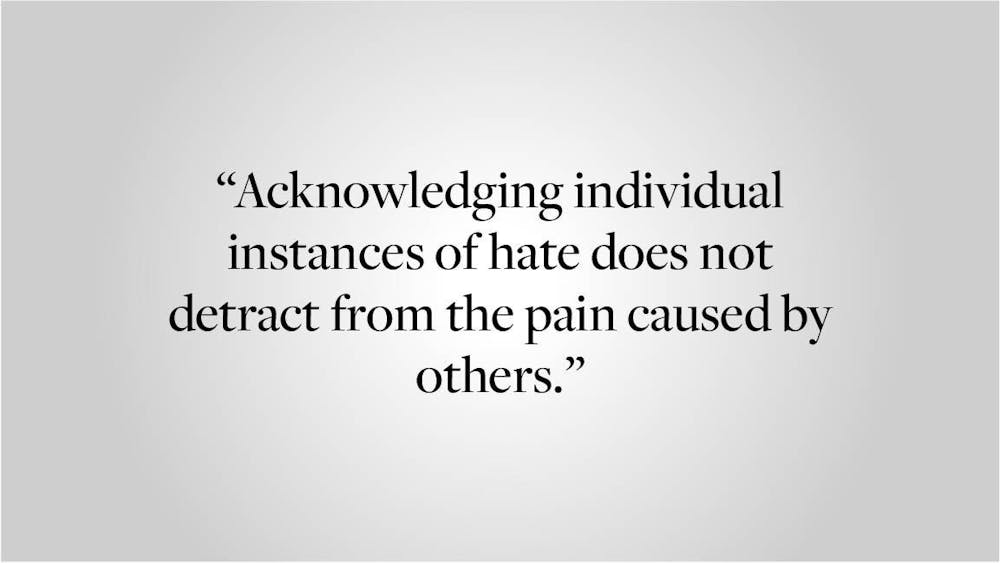In a Nov. 1 email from Vice President for Institutional Equity and Diversity Sylvia Carey-Butler and Vice President for Campus Life Eric Estes to the Brown community, the hateful and violent note left at Brown RISD Hillel last week did not even get its own sentence before Carey-Butler and Estes moved on to vaguely decry other “incidents of bias” seen on and around campus in recent weeks, as well as listing support resources to students.
Why is it not enough to specifically condemn an antisemitic incident?
To be clear, there is nothing wrong with tying other forms of hatred and violence into a conversation about antisemitism. In fact, it is vital to look at this incident within its broader context. We Jewish people are not the only ones harmed by the nationwide rise in hate crimes.
However, as a Jewish student at Brown, the immediate jump to larger patterns in the community doesn’t make me feel that I am actually being supported. Jewish community members received a note that wasn’t vague or coded in its language, invoking Hitler and calling for direct violence. When the Brown administration doesn’t take the time to acknowledge the significance these words carry, it feels like the Jewish community is supposed to recognize everyone else’s pain before we’ve even gotten a chance to feel the weight of this incident ourselves.
This type of response also fails to provide us with space to see the particular ways in which antisemitism manifests. White supremacy weaponizes conspiratorial hatred of Jewish people as fuel for its racist ideology. Racism and antisemitism amplify each other in deeply insidious ways, but we are unable to effectively see and address those very real connections if we immediately homogenize all forms of hatred.
The antisemitic note at Hillel comes amid a national rise in “incidents of bias against underrepresented communities and communities of color,” as the vice presidents rightfully stated. But by jumping so quickly to that broader message, this email reads as a general survey of hate on campus rather than a call for solidarity in response to this particular incident. The email fails to focus at all on antisemitism, giving me the impression that, as a Jewish student, this incident is somehow not about us.
By not giving condemnation of antisemitism its own moment (or even its own sentence), Brown’s administration does the entire Brown community a disservice. Centering the Jewish community after an incident that specifically targeted them does not take away from the threats other communities face and the care that they also deserve. Moreover, briefly mentioning other hateful actions does not equal meaningful communication about the challenges that other communities have faced on campus. Instead, we are all left without the information we need to effectively support each other.
I appreciate that the intention behind this email was not to devalue the significance of what happened, and I do trust that the vice presidents are taking this incident seriously. However, intentions only go so far, and for me this statement exacerbated a pre-existing intergenerational trauma response — a visceral reaction informed by generations of my ancestors seeing antisemitism rise time and time again with disastrous consequences. I fear that the current wave of antisemitism isn’t taken as seriously as it needs to be — and that Jewish people continue to bear the responsibility of advocating for genuine support from outside our community. A tone-deaf email from my university shouldn’t heighten this concern. We should expect more from administrators whose roles center around equity, inclusion and campus life.
In order for us as a community to stand against all forms of hatred, we must consciously acknowledge both the particular and the universal. We need to respect the significance of each individual act of violence and then come together in solidarity. Failure to do both leaves people feeling unseen and unsupported. Acknowledging individual instances of hate does not detract from the pain caused by others. Recognizing the broader context of recent bigotry should not come at the expense of validating individual communities’ struggles — as it did in this email.
Eiden Spilker ’24 can be reached at eiden_spilker@brown.edu. Please send responses to this opinion to letters@browndailyherald.com and other op-eds to opinions@browndailyherald.com.





